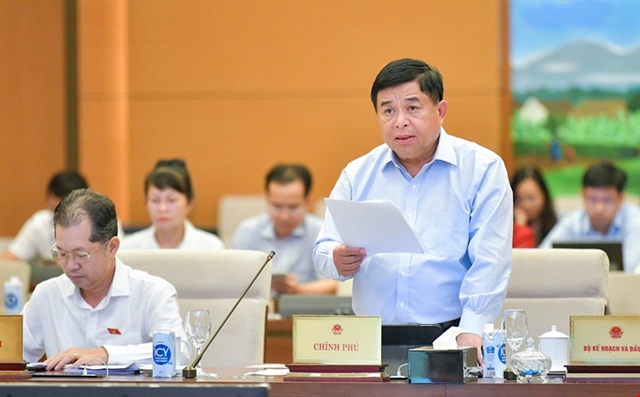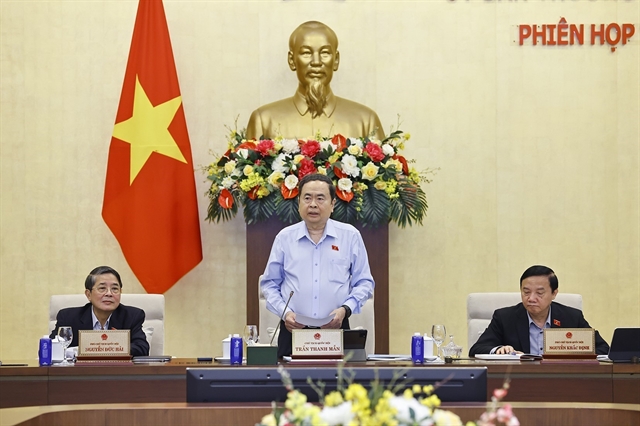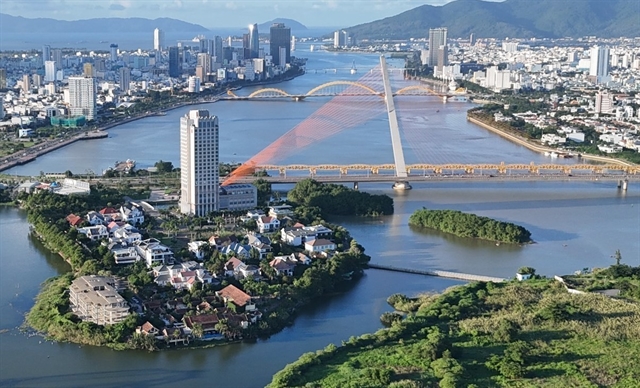 Economy
Economy

 |
| A view of Đà Nẵng City. The State has proposed allowing Đà Nẵng City to pilot the establishment of a Đà Nẵng Free Trade Zone connected to the Liên Chiểu Seaport. — VNA/VNS Photo Văn Dũng |
HÀ NỘI — The Government will consider allowing all localities in the country to develop free trade zones if they meet the necessary conditions and standards, Minister of Planning and Investment Nguyễn Chí Dũng said.
If established, these free zones will enjoy the same mechanisms as the Đà Nẵng Free Trade Zone, Dũng said during a National Assembly (NA) panel discussion late last week.
Earlier, the State has proposed allowing Đà Nẵng City to pilot the establishment of a Đà Nẵng Free Trade Zone connected to the Liên Chiểu Seaport. The goal is to implement experimental policies and mechanisms to attract investment to the area.
The Government is requesting the NA to allow Đà Nẵng City to pilot 30 unique mechanisms and policies, Dũng said.
Under a draft resolution on the urban administration and the piloting of specific mechanisms and policies for Đà Nẵng’s development, the free trade zone will have a defined geographic boundary and be established by the Prime Minister's decision.
Investment and infrastructure development for the functional zones will be decentralised to the Đà Nẵng People's Committee.
The Đà Nẵng Free Trade Zone will offer investment incentives similar to an economic zone, such as corporate income tax incentives, land rental fee exemptions/reductions, along with other benefits.
Businesses operating within the free trade zone will receive priority customs procedures. The Đà Nẵng Hi-Tech Park and Industrial Park Authority will oversee the free trade zone, with the power to implement single-window, on-site mechanisms across different areas.
However, Dũng said, that the country's current laws do not yet have regulations governing the setup and operation of free trade zones, though it is a common global model used to promote international trade and attract foreign direct investment (FDI).
Trần Hoàng Ngân, a National Assembly delegate from HCM City said he supports the development of free trade zones as many countries have achieved success with this economic model, especially those with advantages in seaports such as China (having 21 free trade zones) and Singapore (nine free trade zones) besides Philippines, Indonesia and Malaysia.
Over the past 30 years, free trade zones have developed effectively and contributed to the development of those countries, Ngân said.
With a coastline of 3,260 km and 34 international seaports planned, Ngân said that Việt Nam has enjoyed favorable conditions for establishing free trade zones and Đà Nẵng will be a pioneer in implementing the pilot mechanism.
According to Ngân, when Đà Nẵng successfully establishes a free trade zone, this economic model should be replicated immediately in many other localities that have similar characteristics such as having many seaports that can connect to free trade zones. Among them are Hải Phòng, Bà Rịa-Vũng Tàu, Quảng Ninh, Thanh Hóa, Hà Tĩnh, Khánh Hòa in addition to Bình Định, Quảng Ngãi, Cần Thơ, Trà Vinh and HCM City.
NA delegate Nguyễn Thị Yến from Bà Rịa-Vũng Tàu agreed. She said that when the National Assembly passes the resolution on Đà Nẵng, which will include specific mechanisms and policies for the free trade zone, it should allow other localities to build the same zones and enjoy the same mechanisms and policies as the central city.
Meanwhile, Phan Thái Bình, an NA delegate from Quảng Nam Province emphasised the importance of drawing up regulations on state management for this economic model, which focuses on the management of financial services, supervision of foreign exchange transactions, international finance, taxes and other financial incentives under a specific mechanism.
He also suggested that central agencies, relevant ministries , and departments create favorable conditions for allocating resources, funds , and other resources to help Đà Nẵng implement regulations on specific mechanisms, ensuring transparency and investment attraction.
A breakthrough in administrative reform needed
Minister Dũng said there are two important policies for the Đà Nẵng Free Trade Zone besides preferential policies on tax, land, labour and resources.
The first policy should be a breakthrough in administrative reforms. Dũng offered a Tesla car factory in Shanghai (China) as a good example. It takes only 11 months for the factory with an investment scale of US$2-3 billion, from the start of construction to the time it is put into operation. Similarly, a commercial centre worth hundreds of millions of dollars from construction to completion takes only 68 days.
The administrative procedure behind this success, Dũng said, adding that his ministry supports Đà Nẵng's proposal to make a breakthrough in administrative procedure reforms, resulting in a one-stop-shop mechanism to facilitate foreign investment attraction.
He also suggests allowing large corporations to establish offices in the city without a project. He explains that big companies don't come to the city to play and they will develop projects afterward.
If the city got tied up at the beginning, it would lose the opportunity, Dũng noted. — VNS




